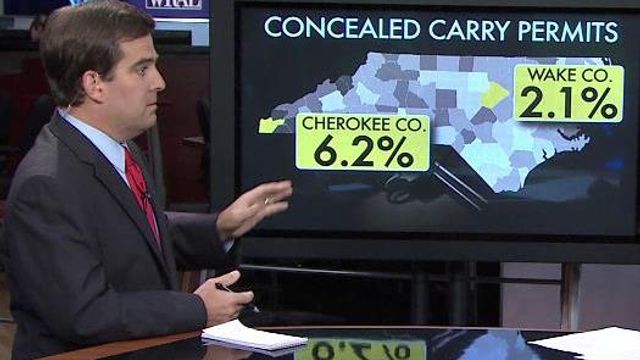Rural areas lead in concealed weapons permit rates
Residents of western North Carolina counties are more likely to hold concealed weapons permits than people in the Triangle.
Posted — UpdatedCharles Elrod knows handguns can make some people nervous.
"We get women who are terrified, who come in and say, 'My husband said I need to learn to shoot this,'" Elrod said, demonstrating how some first-time shooters hold a gun by its butt end between his thumb and index finger.
Elrod sells and repairs guns at the Bear Creek Gun Shop, tucked inside NC Hunter Supply on Millbrook Road in Raleigh. Along with his wife, he also teaches gun safety classes. Among the couple's most popular is the class required for those who want a concealed weapons permit to stow a handgun in their purse or under a suit coat.
Roughly 3 percent of North Carolina's 9.6 million residents hold a concealed weapons permit, a number that is small but on the rise. Elrod said that he teaches classes to a variety of people, including soldiers who want to be able to carry in civilian life, crime victims who want to feel more secure and, increasingly, senior citizens.
"Some of them say it's the criminal element," said Peggy Elrod, Charles' wife and co-instructor.
The Elrods' class is typical of similar classes around the state. It involves a day-long or two evening classroom sessions as well as time spent qualifying on a gun range. State law requires that those who want to qualify hit the target 28 out of 40 shots fired.
"We tell each of them, 'We hope you never, ever have to do this,'" Charles Elrod said. "But in the event you do, we've got to be certain you can hit that bullseye and not hit anyone else, because if you hit bystanders you're in trouble."
Unsurprisingly, the greatest number of concealed weapons permit holders is in the state's most populous counties. Wake County was home to 19,144 concealed weapon permit holders as of June, according to a database maintained by the N.C. Department of Justice.
But in terms of the per capita rate, residents in rural and western counties are much more likely to hold such permits. Wake County ranks 89th in terms of permit holders per capita. Durham County ranks 100th out of 100 counties.
By contrast, more than 6 percent of the residents of Cherokee County in the far western portion of the state have a permit and all of the top 10 counties in per capita ranking are from counties west of Charlotte.
"These people are fiercely independent out here," said Sen. Jim Davis, R-Macon, who represents six of the counties where residents are most likely to hold concealed weapons permits, including Cherokee. Some of that, he said, has to do with a rural culture that includes hunting and a certain level of comfort with guns.
"My default position is that people ought to have the right to carry wherever they have the right to lawfully be," Davis said. But he said police and sheriffs raised questions about the restaurant carry law. "I don't think the statistics back them up on this, but I do understand my law enforcement people's concerns."
Senate leaders have said they plan to revisit the restaurant carry measure next year. Republicans, who controlled the legislature this year, say that permit holders are largely law-abiding citizens who go out of their way to get training and testing that someone with bad intentions would not.
But Gail Neely, executive director of North Carolinians Against Gun Violence, argues that training isn't enough.
"I think if they want to carry outside of their home, they should have more training," she said, arguing that permit holders should have to renew their license every two years rather than every five, and that the renewal should include a re-test of their proficiency in firing a weapon.
While sheriffs can require someone to re-take their concealed weapons test to renew a permit, few do so, say instructors and others knowledgeable about the process.
Neely said police officers are highly trained to make life and death decisions. Those who want to take a similar responsibility on themselves should have to prove they're up to the task.
Charles Elrod said that the training he offers is rigorous and focused on safety. Asked what changes he would like to see to the concealed weapons permit laws, Elrod said he'd like North Carolina to make it easier for residents who move here from elsewhere to have permits from other states recognized.
"It really taxes people to have to go through this whole thing again," he said.
Figuring he's trained somewhere around 500 people in his concealed weapons class over the past five years or so, Elrod said people should be able to make the choice to look after themselves.
"It's better to have it and not need it than to need it and not have it," Elrod said.
• Credits
Copyright 2024 by Capitol Broadcasting Company. All rights reserved. This material may not be published, broadcast, rewritten or redistributed.





